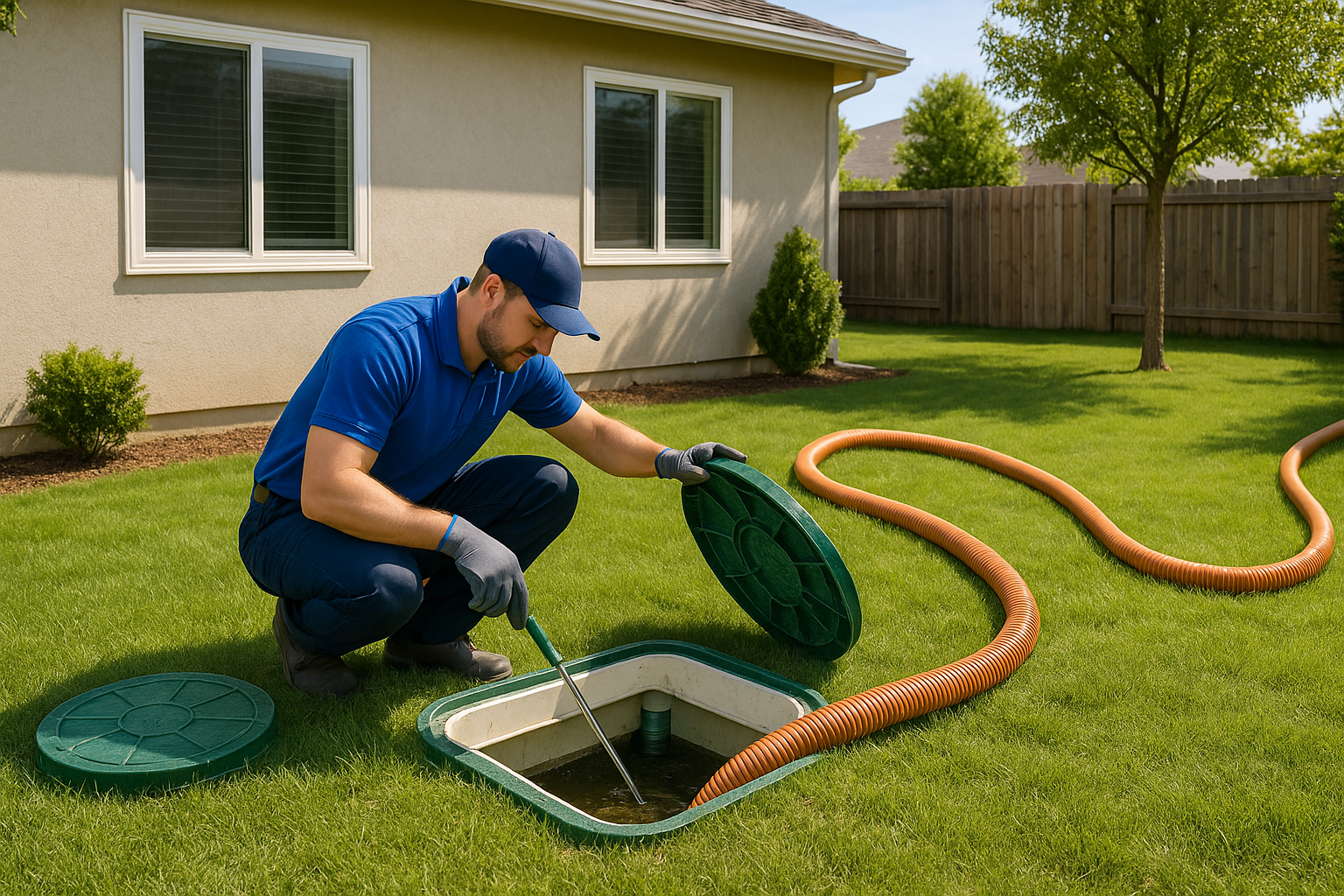Why Your Septic Cleaning Schedule Matters
If you have ever wondered how often you should empty a septic tank, you are not alone. Many Sacramento homeowners struggle to understand the right septic cleaning schedule because septic issues often appear only after damage has occurred. Since repairs can be expensive, maintaining your system is essential for protecting your home and yard.
Following a consistent septic tank pumping frequency helps prevent backups, odors, slow drains, and drain field problems. Homeowners who maintain a dependable septic tank maintenance schedule typically enjoy fewer emergencies and longer system life. Organizations like the EPA also emphasize routine septic maintenance as a key part of responsible homeownership.
This guide explains how often you should clean your septic tank in Sacramento, what affects your pumping frequency, and how to keep your system healthy year-round.
Understanding Your Septic Cleaning Timeline
A septic cleaning schedule outlines how often a septic tank needs pumping, inspection, and routine care. While many Sacramento homes require pumping every 3 to 5 years, several factors influence how often a septic tank should be pumped or how often a septic tank needs to be emptied.
A well-managed septic cleaning schedule protects your home from costly repairs, keeps your system efficient, and promotes environmental safety. Trusted resources like Bob Vila often recommend setting a predictable maintenance routine instead of waiting for warning signs.
How Often Should You Clean Your Septic Tank in Sacramento?
Below are the major factors that determine how often to pump septic tank systems in Sacramento.
Step 1: Measure Your Household Size
Household size affects how often to empty septic tank systems because each person adds daily wastewater. More occupants mean solids accumulate faster, which shortens how often a septic tank should be pumped. Homes with five or more people typically require pumping every 2 to 3 years. Home maintenance sources like HomeGuide support these recommendations.
Local services such as septic tank cleaning and pumping can help evaluate your household’s ideal interval.
Step 2: Evaluate Your Water Use Habits
Water usage plays a major role in how often to pump a septic tank. Long showers, heavy laundry loads, and frequent dishwasher cycles push more wastewater into the system, reducing the time between pumpings. High water usage often changes how often you empty a septic tank by accelerating buildup.
Using low-flow fixtures or efficient appliances, as recommended by Angi, can extend your septic cleaning schedule significantly.
Step 3: Identify Tank Size and Age
Tank size and age help determine how often should you empty a septic tank. Smaller tanks fill more quickly, while older tanks may accumulate residue that shortens how often does a septic tank need to be emptied. Larger tanks offer more flexibility, but if you are unsure of your tank’s size, you can use services like tank locating and outlet baffle replacement.
New homeowners can also benefit from real estate septic system inspections to confirm tank capacity and condition.
Step 4: Watch for Warning Signs of a Full Tank
Even when you follow a set septic tank maintenance schedule, your system may show signs of needing service earlier than expected. Slow drains, gurgling pipes, sewage odors, soggy ground above the drain field, or bright green grass often indicate that pumping is overdue.
Consumer resources like Forbes Home list these as common indicators in determining how often do you empty a septic tank. Tracking symptoms can help you identify emerging problems before they require expensive repairs.
Step 5: Follow Sacramento’s Local Recommendations
Sacramento’s soil and climate can influence how often a septic tank should be pumped. Clay-heavy soil and hot summers can put extra strain on septic systems. Many local experts recommend a 3-year septic cleaning schedule for optimal performance.
Homes with lift stations should stay current with lift station pumping to keep all components working efficiently.
Practical Applications for a Local Septic Schedule
Below are examples of how often to pump a 1000 gallon septic tank and other system sizes based on Sacramento household types:
A household of four with high water usage may require pumping every 2 to 3 years. Keeping this schedule helps prevent backups and maintain efficiency.
A retired couple with low water use may be able to extend their septic cleaning schedule to 4 to 5 years thanks to lower wastewater output.
Rural properties with large tanks or filtration systems may need custom schedules. Some larger tanks require annual inspections even if pumping is not needed. Upgrades like septic risers and lid installation make maintenance easier.
Following these real-world guidelines helps ensure that your system remains reliable regardless of tank size or usage.
Tips, Best Practices, and Common Mistakes
Here are essential tips that influence how often should a 1000 gallon septic tank be pumped or how often to pump a 1000 gallon septic tank in different situations.
• Avoid flushing non-biodegradable items
Flushing wipes, paper towels, or hygiene products increases how often should a septic tank be pumped because they do not break down properly.
• Spread out water usage
Spacing out laundry loads and showers helps improve how often does a septic tank need to be emptied by reducing pressure on the system.
• Schedule yearly inspections
Inspections help detect early problems and stabilize your septic tank pumping frequency. Blue Ribbon Septic offers helpful advice through their septic tank care tips.
• Protect your drain field
Keeping vehicles, heavy structures, and deep-rooted trees off the drain field promotes long-term septic health.
• Track your pumping dates
Recording pumping dates helps you predict how often to pump a 1000 gallon septic tank or larger systems more accurately.
Keeping Your Septic Schedule on Track
A consistent septic cleaning schedule protects your Sacramento home and keeps your entire system working efficiently. Understanding water usage, household size, and tank capacity helps determine how often to pump septic tank systems in any environment.
If you need guidance determining how often should a 1000 gallon septic tank be pumped or want personalized recommendations, local experts can provide tailored advice for Sacramento’s conditions.
Frequently Asked Questions
1. How often should you clean your septic tank in Sacramento?
Most homes require pumping every 3 to 5 years. Homes with higher use may need more frequent service.
2. What are signs that your septic tank needs pumping?
Slow drains, odors, gurgling pipes, or wet spots above the drain field.
3. Can waiting too long cause damage?
Yes. Delaying maintenance can lead to backups and drain field failure.
4. Does household size affect pumping frequency?
Yes. More people result in faster wastewater accumulation.
5. Is septic maintenance different in Sacramento?
Yes. Soil and climate conditions often make a 3 year schedule ideal.






